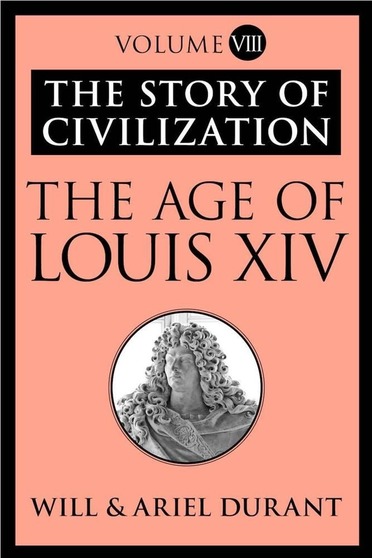










The Story of Civilization, Volume VIII: A history of European civilization in the period of Pascal, Moliere, Cromwell, Milton, Peter the Great, Newton, and Spinoza: 1648-1715. This is the eighth volume of the Pulitzer Prize-winning series.Will (and later) Ariel Durant were awarded the Pulitzer Prize in 1968 and the Presidential Medal of Freedom in 1977, primarily for this 11-volume series, "The Story of Civilization," which is probably the last attempt we will ever see---in this age of increasing specialization---of a single historian (or couple) attempting a "universal history."
He wrote in the Preface to this 1935 volume, "I wish to tell as much as I can... of the contributions that genius and labor have made to the cultural heritage of mankind... I have long felt that our usual method of writing history in separate longitudinal sections... does injustice to the unity of human life." He originally planned on issuing only five volumes, but the project expanded (particularly as he reached The Enlightenment).
He begins by stating, "Civilization is social order promoting cultural creation. Four elements constitute it: economic provision, political organization, moral traditions, and the pursuit of knowledge and the arts. It begins where chaos and insecurity end." (Pg. 1) He adds, "Man differs from the beast only by education, which may be defined as the technique of transmitting civilization." (Pg. 4)
He observes, "Most economic advances, in early society, were made by the woman rather than the man... she developed agriculture near the camp, and those busy arts of the home which were to become the most important industries of later days." (Pg. 33) He suggests, "There is hardly any superstition so old but that it can be found flourishing somewhere today. Civilization is the precarious labor and luxury of a minority; the basic masses of mankind hardly change from millennium to millennium." (Pg. 59) Still, "It is a poor civilization from which we may not learn something to improve our own." (Pg. 127)
He laments, "This is the tragedy of every civilization---that its soul is in its faith, and seldom survives philosophy." (Pg. 193) He concludes, "The first lesson of philosophy is that we may all be mistaken." (Pg. 845) He ultimately suggests eight elements of civilization: Labor; government; morality; religion; science; philosophy; letters (i.e., transmission of language, writing); and art. (Pg. 934-936)
Although often forgotten in modern times, the Durants' series was once a staple of "Book-of-the-Month Club" introductory promotions, and widely read. It is still of immense value for someone wanting a comprehensive and unified "view" of history from a single author (or later, two married authors).

